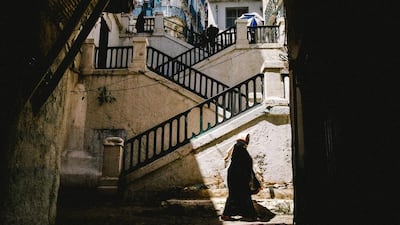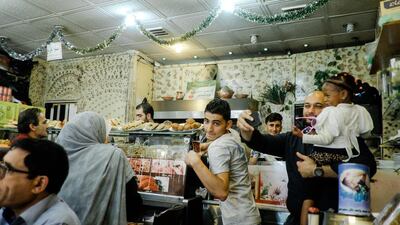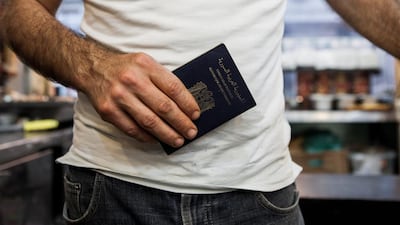Wafaa Shabbat flicks through the television channels in search for Bab Al-Hara, the popular Syrian drama in its eighth season this Ramadan. "Bab Al-Hara is how I feel it's Ramadan here in Algeria," she says.
On the floor next to her is a big spread of Syrian food: tabbouleh, fatteh with tahini, thick lentil soup. The plates are now empty, and her husband, singer and actor Abdul Rauf Shabbat, and their 16-year-old son, Muhammad, start bringing everything back to the kitchen.
The family came from Damascus in 2012 and now live in a suburb, one hour’s drive east of the capital Algiers. Like so many Syrian families, they have family members scattered around the world. One daughter is in Germany, the two eldest still in Damascus. Wafaa shows photos of them and their children: grandchildren whom they still have not met.
“We talk to them every day, send photos and videos. But we miss them all the time,” she says.
“I miss Syria too, especially on Ramadan. We used to celebrate with all the communities in Damascus: Syrians and Palestinians, Christians also, together.”
Abdul Rauf, now with a plate of knafeh sprinkled with pistachios, smiles. He misses the Ramadan sweets of Damascus, he says.
“And my friends of course, we would always meet in the evenings to sing and talk, smoke shisha. Now, they are everywhere – Syria, Australia, Germany, Sweden.”
Back in Algiers, in the suburb of Bir Khadem, is the Syrian restaurant Bawabat Istanbul, open since 2012. Munir Abdullah, a Palestinian born and brought up in the Yarmouk camp in Damascus, lifts his hand from a plate of fried falafel. A tomato cut in the shape of a flower decorates the plate; cumin and paprika is sprinkled on top. He hands it over to Basel Alaghawani, also from Damascus, who brings it out to the table.
“Most of us have been here for a few years. My father studied in Algiers when he was young, that’s why we came here,” Munir says.
It is lunchtime, a few days before Ramadan, and the restaurant, with a warm breeze coming in from the street outside, is full. A father and his daughter share a big plate of shawarma; a group of teenage friends eat the falafel decorated by Munir. Bawabat Istanbul is the only Syrian place in Bir Khadem. All over the capital and other cities in Algeria, new restaurants indicate the Syrian refugee community’s presence in the country.
Up to 43,000 Syrians now live in Algeria, according to UNHCR and government estimates. Most arrived before spring last year, when it was possible to fly into the country and enter with only a Syrian passport. Since then, visa restrictions have been imposed, effectively barring refugees from entering legally.
“They were always welcomed in Algeria, who saw them as brothers and sisters. But when many other countries began imposing visas, they saw no option but to do the same,” says Pascal Reyntjens, from the International Organisation for Migration (IOM) in Algiers.
Since then, and especially with the new agreement between Turkey and the EU to make crossings into Europe harder, a growing number of Syrians are coming to Algeria from the south, through smuggling networks established in Mauritania and Mali. UNHCR’s spokesman in Rabat, Morocco, Anthony Berginc, told news agency IRIN that “more and more Syrian refugees [are] crossing into Algeria” that way.
But still, life in Algeria is better for refugees than in some other countries in the region; there are no camps or squalid settlements such as in Turkey, Jordan or Lebanon. Instead, they are able to rent houses or apartments.
Syrians in Algeria also face less discrimination and anti-refugee resentment. Relations between the countries go back a long way. Few Algerians would fail to mention how Emir Abdelkader, the Algerian national hero who first resisted French colonisation, found refuge in Damascus after imprisonment in France. Today, many associate Syria with popular soap operas, quality clothing and food.
“I have had only good encounters here. People, when they hear you speak the Syrian accent, are nothing but friendly. We feel welcome,” says Rami Turkman, manager of Bawabat Istanbul.
He came to Algeria in 2012 like the others, fleeing his native Homs and the destruction brought by the fighting between the Free Syrian Army and the regime.
“I literally kidnapped my mum and dad. I took their passports and brought them to the airport; they would have never left otherwise.”
Rami walks around among the tables, sharing small talk with the customers. He picks up a small girl with colourful braids in her hair, takes out his phone and snaps a selfie of them together.
The restaurant serves food such as that found in Syria, but in the bread basket, next to the pita, are baguettes – essential for any Algerian diner. Phrases like “bien sûr” or “la bass”, Algerian for “how are you”, have been added to the staff’s Syrian vocabulary.
This Ramadan is the fourth Munir and the others are spending in Algeria. He says he tries to be happy because he is with his family, rather than thinking about home.
“But of course I miss Ramadan in Old Damascus. There’s nothing like it.”
Each year, he says, communal iftars were prepared for the poor, with donations from restaurants and wealthy Damascenes.
“And in the mornings, before daybreak, the musaharatis would go around and wake people up with their drums and songs. In the evenings, you had Sufi dancers.”
Basel takes out his phone and plays a YouTube clip with iconic singer Tawfiq Al Munjid, whose voice would sound at daybreak from the Umayyad Mosque. For a brief moment, hearing him sing brings everyone back to Old Damascus.
On the wall behind the restaurant counter there hangs a collection of photos of family members, smiling children and a portrait of a young man. He used to work at the restaurant, says Rami.
“But he left for Europe. Harraga,” he says, citing the North African term for a migrant, and the refugee journey.
Bawabat Istanbul once had five branches in Algiers but since staff have left for Europe, only three remain.
Many Syrians come to Algeria with a plan to try to reach Europe. Migration routes go either through Morocco or Libya; the latter is more dangerous, with lawlessness and extremist groups, but finding a way overland to Spain is becoming increasingly difficult.
Among those who stay, many take jobs in trades, shops or restaurants. As for Abdul Rauf, he has continued to sing and act in Algeria. He shows photos from a film set in the Algerian desert and an episode of Alhane Wa Chabab, Algeria's TV talent show, where he gives singing lessons to the participants.
A bit farther from the city centre is Baba Hassan, a suburb that has been home to Syrian families for generations. Now, many refugees have moved in. A recently opened restaurant has soft couches and a counter full of Syrian sweets. Its menu, similar to that at Bawabat Istanbul, has the citadel of Aleppo printed on its cover.
Nour Derdar has worked there since she arrived from Damascus two years ago. Life in Algeria is good, she says.
“There are no camps here, it is not overcrowded like in Jordan and Lebanon. And my kids go to school; they are doing fine.”
Refugees and migrants have the right to health care and education to year six. Still, access to both hospitals and schools remains an issue, says journalist Faten Hayad.
“The law says that schools should keep [stay] open to all children, but in reality this is not the case. Many schools say that they are full and just close their doors.”
This affects migrants and refugees from Africa more than the Syrians, she says. More than 100,000 people from countries like Niger, Mali, Cameroon and the Central African Republic live in Algeria, and face a much tougher reality. They have been the victims of anti-migrant attacks and their living conditions are usually bad.
The main issue, for Syrian refugees as well as migrant workers, is that being a refugee does not allow them to work legally. Most people would rather not talk about how they make a living.
“Everyone is forced to work without papers. And you can’t do anything in your name. Buy a car, a house, anything for the future,” says Anas Aamar, who works with Nour.
When Wafaa and Abdul Rauf think about the future, their greatest wish is to be reunited with their daughters and grandchildren. But when and if that will happen, they don’t know.
“There are fewer and fewer ways out of Syria these days, so what can we do?” says Wafaa.
Jenny Gustafsson is a Swedish freelance journalist living in Beirut.



